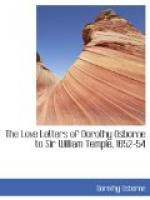Here is a ring: it must not be at all wider than this, which is rather too big for me than otherwise; but that is a good fault, and counted lucky by superstitious people. I am not so, though: ’tis indifferent whether there be any word in’t or not; only ’tis as well without, and will make my wearing it the less observed. You must give Nan leave to cut a lock of your hair for me, too. Oh, my heart! what a sigh was there! I will not tell you how many this journey causes; nor the fear and apprehensions I have for you. No, I long to be rid of you, am afraid you will not go soon enough: do not you believe this? No, my dearest, I know you do not, whate’er you say, you cannot doubt that I am yours.
Letter 51.—Lady Newport was the wife of the Earl of Newport, and mother of Lady Anne Blunt of whom we heard something in former letters. She is mentioned as a prominent leader of London society. In March 1652 she is granted a pass to leave the country, on condition that she gives security to do nothing prejudicial to the State; from which we may draw the inference that she was a political notability.
My Lady Devonshire was Christian, daughter of Lord Bruce of Kinloss. She married William Cavendish, second Earl of Devonshire. Her daughter Anne married Lord Rich, and died suddenly in 1638. Pomfret, Godolphin, and Falkland celebrated her virtues in verse, and Waller wrote her funeral hymn, which is still known to some of us,—
The
Lady Rich is dead.
Heartrending
news! and dreadful to those few
Who
her resemble and her steps pursue,
That
Death should license have to range among
The
fair, the wise, the virtuous, and the young.
It was the only son of Lady Rich who married Frances Cromwell.
Lord Warwick was the father of Robert, Lord Rich, and we may gather from this letter that, at Lady Devonshire’s instigation, he had interfered in a proposed second marriage between his son and some fair unknown.
Parthenissa is only just out. It is the latest thing in literary circles. We find it advertised in Mercurius Politicus, 19th January 1654:—“Parthenissa, that most famous romance, composed by the Lord Broghill, and dedicated to the Lady Northumberland.” It is a romance of the style of Cleopatre and Cyrus, to enjoy which in the nineteenth century would require a curious and acquired taste. L’illustre Bassa was a romance of Scuderi; and the passage in the epistle to which Dorothy refers,—we quote it from a translation by one Henry Cogan, 1652,—runs as follows: “And if you see not my hero persecuted with love by women, it is not because he was not amiable, and that he could not be loved, but because it would clash with civility in the persons of ladies, and with true resemblance in that of men, who rarely show themselves cruel unto them, nor in doing it could have any good grace.”




